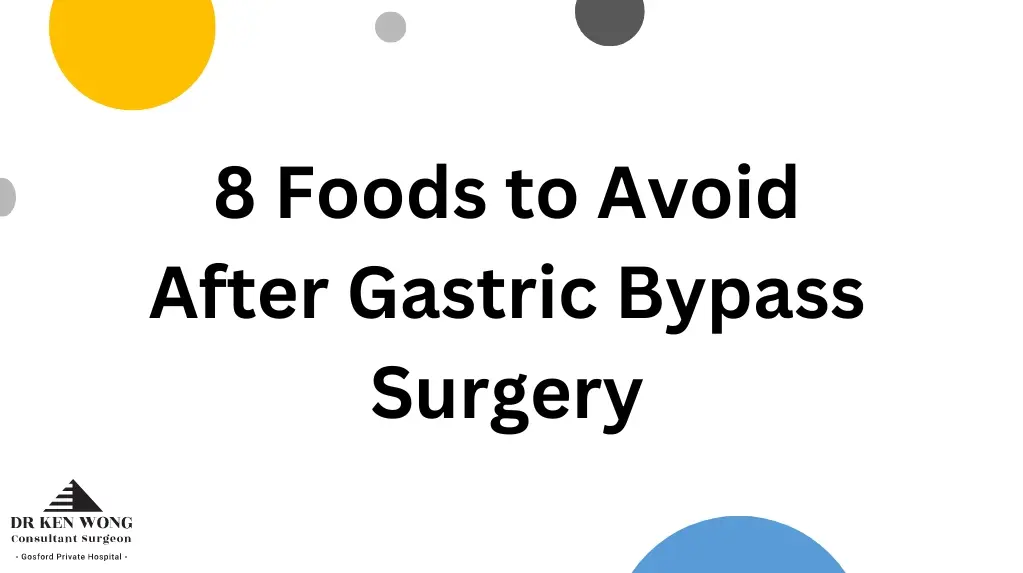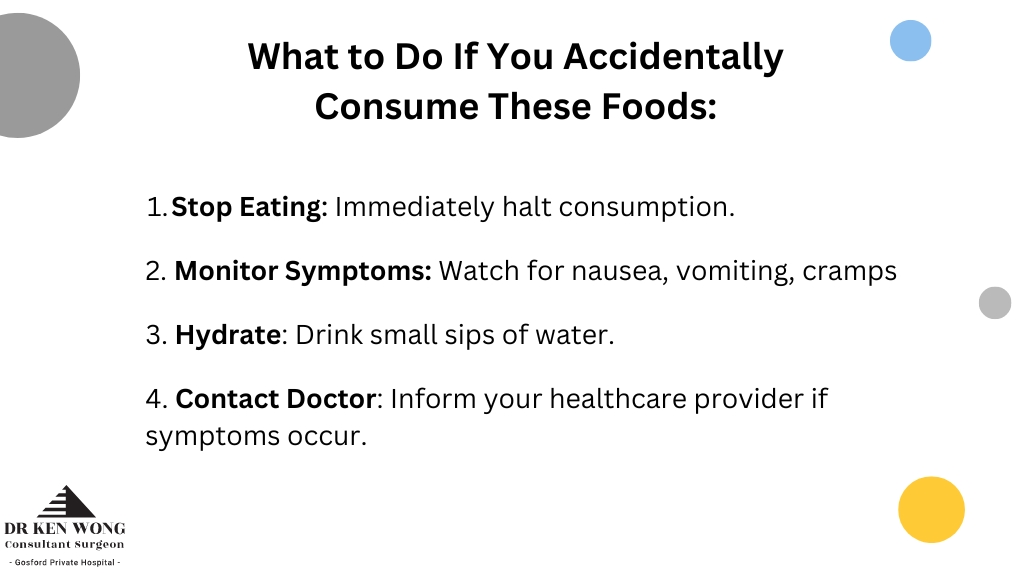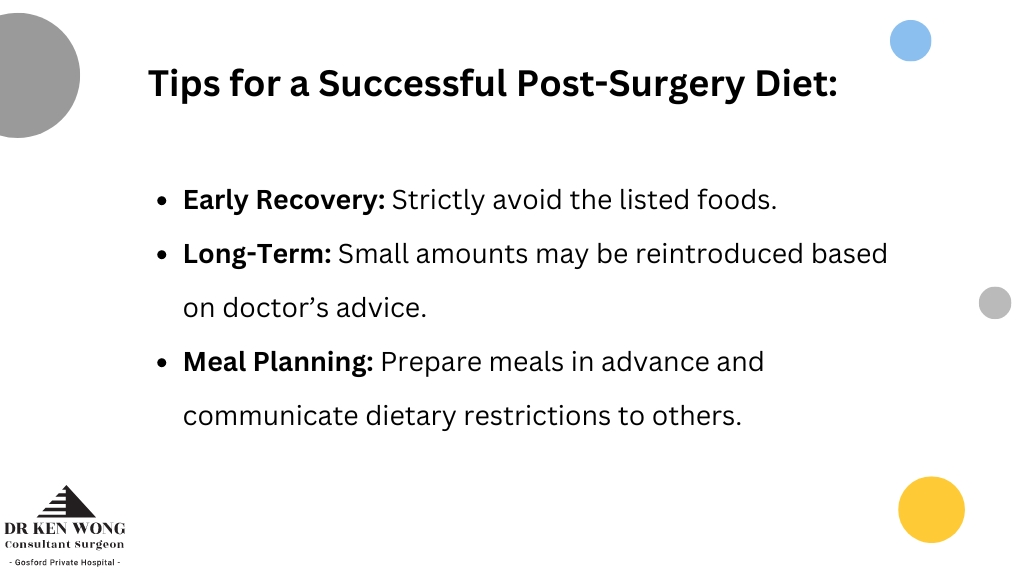
Gastric bypass surgery can significantly improve the quality of life for individuals that struggle with obesity by helping them achieve lasting weight loss.
When it comes to eating habits after gastric bypass surgery, however, there are certain foods that can no longer be put on the plate. The drastically reduced size of the stomach post-surgery means that it has a reduced ability to digest and process specific types of food and drink like:
-
Sugary foods and beverages
Sugar doesn’t play nice with the stomach after gastric bypass surgery — it can cause food to move from the stomach to the small intestine too rapidly, resulting in unpleasant side effect known as “dumping syndrome”. Dumping syndrome usually involves feelings of nausea, vomiting, cramps, excessive sweating, and dizziness — in a nutshell, it’s something to avoid.
Avoid high-sugar drinks, sweets, and desserts, even if they contain other artificial sweeteners in place of sugar, as well as those that contain natural sugar such as fruit juice.
-
Dry or starchy foods
Stay away from dry foods like nuts and biscuits, especially in the months after undergoing the surgery when the sensitive stomach is healing. Your new diet will require you to drink liquids outside of mealtimes, so eating dry foods on their own resulting in difficulty when swallowing. Try eating smaller pieces of dry foods and see how your stomach reacts to them — if there are no adverse reactions, a little dry food can eventually be added to the post-surgery diet.
The same goes for starchy foods like bread, rice, and noodles — these can take up a lot of the new stomach’s limited space and should be consumed in small portions to avoid risks like blockages in the digestive tract.
-
Alcohol
Alcohol contains a high number of calories — your nutritionist will advise you to exclude it from the new diet for at least the first 6 months to reserve the precious little space in the new stomach for foods that are packed with essential nutrients and vitamins.
Another reason for the exclusion of alcohol is that the new digestive system will absorb alcohol much quicker, leading to increased levels of intoxication. A small glass of wine may make you feel like you’ve already had several.
-
Greasy and fatty food
Oily and fatty foods are an obvious one to eliminate from the post-gastric bypass surgery diet. Consuming foods high in fat such as bacon, butter, or anything that’s fried in oil will set back your weight loss efforts, while potentially causing dumping syndrome.
Whole dairy products like hard cheeses, ice cream, and full-fat yoghurt also count as high-fat food — skip these in favour of low-fat and unsweetened options.
-
Spicy food
Regardless of your tolerance for them, spicy foods pose a potential risk for your stomach, especially during the period when it is still healing from the surgery. Spices can cause uncomfortable and even painful irritation at the incision site of the stomach and possibly result in conditions like heartburn or stomach upset.

-
Tough meat
Big cuts of meats like steak, pork chop, and sausages, are much more difficult for the new stomach to digest, even after thorough chewing. When including a protein in future meals, opt for minced meats like chicken or turkey, or softer meat like baked fish.
-
Fibrous fruits and veggies
Fruits and vegetables will provide a lot of the nutrients in the post-surgery diet, but those heavy in fibre can be difficult for your stomach to process. These include veggies like celery, broccoli, cauliflower, and corn, as well as fruits like pineapple and grapes.
-
Carbonated drinks
Gassy drinks, sweetened or not, should be avoided at all costs. The gas from these drinks will build up in the stomach, causing it to expand and undo the results of the surgery. This build-up of gas can also induce feelings of discomfort due to bloating.
Does this mean I can never eat these foods again after gastric bypass?
Most of the foods we’ve listed should be completely avoided in the early stages of recovery after gastric bypass surgery as they could cause dangerous complications. That being said, after you’ve got used to eating solid food again, you may be able to eat very small amounts of these foods over time, depending on what your doctor says.
Keep in mind that the goal of gastric bypass surgery is to achieve lasting weight loss, so try to avoid eating these foods as much as possible for the best results.

What should I do if I accidentally consume these foods?
Accidental consumption of certain foods can happen from time to time. If you do realise that you’ve eaten or drunk something you’re not supposed to simply follow these steps:
-
Stop eating: Don’t consume any more of the food or drink. Doing so may worsen the consequences.
-
Monitor your body: Check on how you feel for the next few hours. If you experience any discomfort like nausea, vomiting, or cramps, get in touch with your doctor or nutritionist immediately and inform them of the situation.
-
Hydrate: Continue drinking small sips of water to help your body stay hydrated.
To avoid eating any foods you shouldn’t, plan ahead for your meals by packing or preparing them beforehand or informing those close to you about your dietary restrictions.
At Central Coast Surgery, we offer gastric bypass surgery and gastric sleeve surgery in Newcastle to help individuals live their best lives and achieve a healthy weight, as well as provide targeted advice for our patients in terms of the post-surgery diet.
